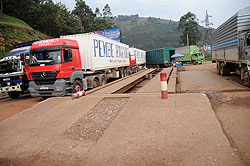After the East African Community (EAC) heads of state signed the Common Market Protocol on November 2009, in order to facilitate the free movement of goods, labour and capital, it was thought that it would create a favourable atmosphere for regional trade.


After the East African Community (EAC) heads of state signed the Common Market Protocol on November 2009, in order to facilitate the free movement of goods, labour and capital, it was thought that it would create a favourable atmosphere for regional trade.
Since then, however, various Non-Tarrif Barriers (NTBs) have persisted, impeding regional trade.
The issue of regional NTBs, which are quantitative restrictions and specific limitations that act as obstacles to trade, and which appear in the form of rules, regulations and laws that have a negative impact on trade, has moved away from simply being an EAC issue to a bilateral one.
It’s in this vein that Rwanda has begun bilateral negotiations with partner states to eliminate these barriers.
Yesterday, Rwandan technical experts on trade from the Ministry of Trade and Commerce (Minicom) started a two-day meeting with their Ugandan counterparts in Kabale, Uganda, to help end trade barriers that are currently hindering trade between the two countries.
Vincent Safari, the coordinator of National Monitoring Committee (NMC), established to help tackle the trade barriers, said that it was imperative to have bilateral arrangements since the EAC Secretariat had failed.
"We realised that it would be better to discuss the NTBs at the bilateral level instead of using the existing regional platform. The EAC Secretariat has no enforcement mechanisms to help remove these barriers”, he said
A report released recently by the National Monitoring Committee indicates Rwandan traders encounter various forms of barriers inside Uganda, especially road blocks, weighbridges and lack of certificates of origin at borders.
Safari told The New Times that Rwanda was engaging individual EAC partner states on the barriers, saying the next round of talks would be with Tanzania and Kenya.
During the negotiations, they will also discuss other bilateral trade opportunities.
Janet Nkubana, the chairperson of the Rwandan Exporters Association, welcomed the move, but indicated that the biggest challenges were encountered in Kenya.
Critics argue the EAC has failed to address the issue of NTBs among partner states, forcing individual countries to attempt to address the issue through bilateral arrangements.
Although Article 13 of the Customs Union Protocol of the EAC requires partner states to eliminate all existing non-tariff barriers to trade and not impose any new ones, little progress has been registered.


